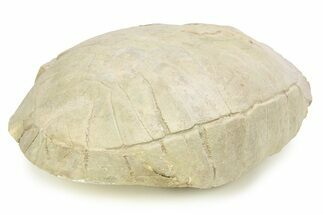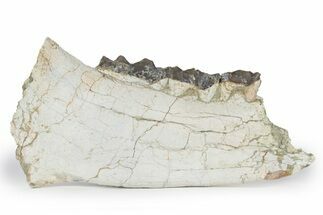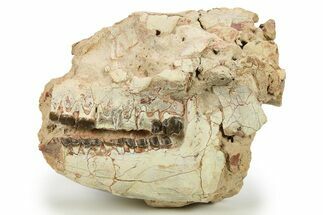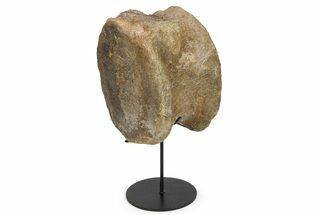This Specimen has been sold.
11" Fossil Tortoise (Stylemys) with Visible Limb Bone - Wyoming
This is a beautiful, 11" tortoise (Stylemys nebrascensis) shell from the White River Formation in Wyoming. Both the carapace and the plastron are present, along with an exposed limb bone (femur) within the rock. It is well inflated, in good condition and largely intact. Many of the tortoises from this formation are quite compressed, so this specimen is really something special.
Many of the marginal scutes along the anterior and posterior edges of the carapace are either completely or partially restored. The central scutes at the posterior end of the shell are also restored. The anterior most scutes along the plastron have undergone some restoration. In total, restoration makes up approximately 5% of the specimen.
Many of the marginal scutes along the anterior and posterior edges of the carapace are either completely or partially restored. The central scutes at the posterior end of the shell are also restored. The anterior most scutes along the plastron have undergone some restoration. In total, restoration makes up approximately 5% of the specimen.
Stylemys ("pillar turtle") is the first fossil genus of dry land tortoise discovered in the United States. They lived in temperate to subtropical areas of North America, Europe, and Asia.
These extinct tortoises had primitive jaw muscles, unlike today's tortoises that also display the os transiliens bone, and would have been herbivorous. While Stylemys species did exhibit the same neck structure as modern tortoises, the forelimbs weren't ideal for burrowing.
These extinct tortoises had primitive jaw muscles, unlike today's tortoises that also display the os transiliens bone, and would have been herbivorous. While Stylemys species did exhibit the same neck structure as modern tortoises, the forelimbs weren't ideal for burrowing.
SPECIES
Stylemys nebrascensis
AGE
LOCATION
Converse County, Wyoming
FORMATION
White River Formation
SIZE
11" long, 8.25" wide, 3.55" tall
CATEGORY
SUB CATEGORY
ITEM
#281492
We guarantee the authenticity of all of our specimens.
 Reviews
Reviews
















